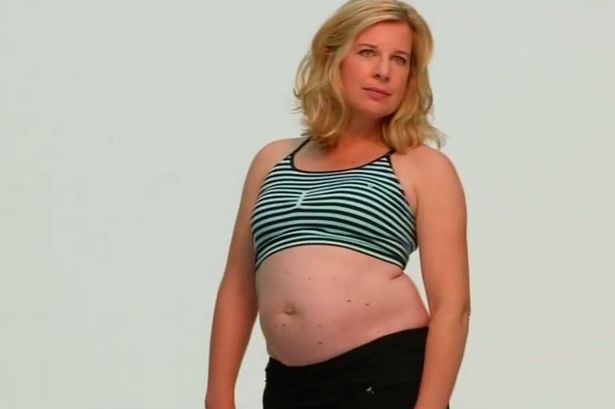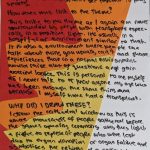I don’t trust people who don’t love themselves and tell me “I love you.” … There is an African saying which is: “Be careful when a naked person offers you a shirt.” – Maya Angelou
Last year I wrote a blog, Katie Hopkins’s #myfatstory is a story of vulnerability, about Katie Hopkins’s TV documentary on TLC.
I wanted to understand what makes Katie Hopkins tick, particularly when she is busy criticising people who are overweight. Satisfied with my pop psychology, I buried the blog post amongst the others on here, thinking that no one would ever read it. How wrong I was. That blog was number 5 in my top 10 most popular blogs of 2015.
TLC aired another Hopkins show Fat Story One Year On, early January 2016, which drove even more traffic here. Curious, I watched her new program with some dread, as spending time in her company, albeit virtually, is not an uplifting way to spend 45 minutes.
In this new documentary, Hopkins is back to her normal weight and out to investigate whether she has had any impact on Fat Britain as she calls it: I put my body on the line and [we are] still piling more crap into our faces… are we happy just getting fatter together?
To do this she:
- Invited a plus size model to a photo shoot and turned to the camera to say: It isn’t pretty. She then got her face photoshopped onto the model’s body to produce the above picture.
- Chatted with Tam Fry, spokesperson for the National Obesity Forum, who said that half the country will be obese by 2050, even though he has admitted elsewhere that there is no proof for those statistics.
- Asked the parents of Samantha Packer, who tragically died last year at 20 years old, and who was known to the public as an obese teenager, why they didn’t stop her overeating, all the while expressing her righteous indignation.
- Interviewed an anorexic woman, supposedly to get an idea of life at the other end of the spectrum, whilst saying that going to the North of England was, for her, like going to Mars.
- Interviewed an obese pregnant woman and said that it wasn’t ok to be a fat mum but that the woman Angela, herself was fine because Angela chastised herself a lot and felt bad about herself.
- Lay in a coffin designed for an overweight person and made sneery comments.
At each moment in the program, it felt that – like last year’s documentary – there was another story going on and that this program was very much about Katie Hopkins.
Hopkins began by saying: There’s merit in saying things a little kindly but had to add … as it’s hard to be fat. And then included flashbacks to the previous documentary with Hopkins slagging herself off: Oh God I look awful…That arse is going to eat that bike…that woman became someone completely foreign… I am so fat I can’t go out.
When did Hopkins decide that being overweight was such a bad thing? And when did she begin talking to herself like that?
The vicious tone she used to speak about herself was frightening. If she thinks it’s ok to say that to herself, no wonder she is more than capable of the trolling she does on Twitter and elsewhere in the media. She has barely warmed up! And, then that comment as she travelled to Durham: I don’t come this far North ever. It’s like going to Mars, was very telling. First of all it was not true as she had gone to Newcastle the year before. Secondly, it was an unsuccessful attempt at humour, and a truth: She sees the North as somewhere alien to her. She has difficulty understanding places and people seemingly different to herself. And the reason for this, in Sociologist Brene Brown’s words is, she armours up and goes out to defend herself, instead of viewing others as just like her. But to do so would make her feel vulnerable.
This was demonstrated perfectly when Hopkins went to see the same psychologist she had seen the year before. Before going in, she said: The weight I put on was dreadful. But, with the weight gone, she was no longer vulnerable: I feel tough, nothing or no one can touch me. Last year, she had cried in the psychologist’s office. This year: I am determined it won’t be the case today. I am not crying!
Hopkins prefers her righteous indignation – anger is easier than fear – and stated being fat is weak, and said that she doesn’t sympathise with overweight people but she empathises with them. The Oxford Dictionary says:
People often confuse the words empathy and sympathy. Empathy means ‘the ability to understand and share the feelings of another’ (as in both authors have the skill to make you feel empathy with their heroines), whereas sympathy means ‘feelings of pity and sorrow for someone else’s misfortune’ (as in they had great sympathy for the flood victims).
You can’t judge someone as weak and feel empathy at the same time. You can’t look at someone, saying things like: It’s not pretty, whilst seeing them as whole with feelings and recognise that they are human just like you.
Hopkins put on three stones and then lost it again very rapidly. In no way does this give her any insight into people who are overweight and struggling. She has a purely functional relationship with food, which is really rare. Who has that? No one I know. In no way does this give her any insight into people who are very successful in other areas of life but feel completely out of control near food. Just because she knows how she felt to be overweight, to assume everyone feels the same way as her is naive, at best.
Hopkins wants to help people who are overweight. Come with me. She knows what to do: Eat less, move more. Really? The dieting industry would not exist if it was that simple. Nowhere in this program was the issue of compulsive eating addressed, for that would mean being recognising people as complex human beings who are vulnerable – something Hopkins hates and refuses to feel. You cannot give someone something you do not have. And you cannot put conditions on empathy.
Hopkins did a fitness challenge with Charlotte, an overweight fitness instructor. When the results came in and Charlotte was deemed to be just as healthy. Hopkins criticised herself at length: I have teeny tiny legs, in comparison to Charlotte…Charlotte looks younger and healthier… Hopkins stood very closely to Charlotte whilst gurning away in her new empathetic manner, as they discussed the results. Afterwards when talking to the camera, Hopkins comments were childish: If one person is strong, the other person is weak, Charlotte looks younger and healthier, I am haggard. It was a zero sum approach – a child’s attitude, demonstrating again that this program was all about needy Hopkins and not about overweight people at all. Her conclusions was that Charlotte was fine: It’s fat lazy people who get on my tits. Is this an improvement on her fat people are lazy mantra? No, just lazy.
During filming, Hopkins blacked out during an epilepsy episode and a group of people came to her aid. She said that people were being super kind, and she felt super safe which was sweet but strange. This is telling. Why is it strange that people are kind and look after others?
Counsellor and teacher Byron Katie says that whatever goes on in the world is 100% a reflection of how we feel inside ourselves. She has four questions called The work which asks us to question our story and ask who would we be without it. Never have I seen a more powerful demonstration than in Katie Hopkins’s #fatstory of how fat people will drain the NHS. If you do the work on #fatstory, you end up with a second story: Katie Hopkins feels that she is a drain on the NHS. She doesn’t feel worthy of its care and attention. Who would Katie Hopkins be without that story? And would we all benefit?







4 comments